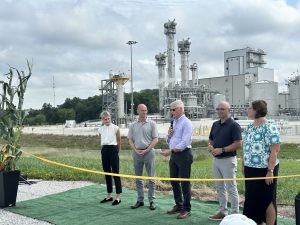Cargill expands Eddyville plant to produce a bio-based alternative to petroleum materials
July 23rd, 2025 by Ric Hanson
(Report from the Iowa Capital Dispatch; Eddyville, IA) – Iowa grown corn will soon end up in apparel like Spanx, and other products typically made with petroleum-based components, following the opening of a new processing facility. Qore, the joint venture between Minnesota-based Cargill and Germany-based HELM AG, celebrated the opening of the $300 million facility Tuesday in Eddyville, and future growth it represents. The facility will take sustainably grown corn from within the area, then grind it and process it into QIRA, which the company said is an “identical replacement” of 1,4-butanediol, a chemical component used to manufacture various polymers.
Officials with Qore and the partnering companies said the venture is a response to consumer demand for more sustainably produced products, but will also stoke the Iowa corn market and local economy, and pave the way for future partnerships to for bio-based alternatives to petroleum-derived products. Jon Veldhouse, CEO of Qore, said Tuesday the project “connects” a “global challenge” with the natural process of corn absorbing CO2 and turning light into plant energy. Qore has already partnered with a number of brands, the first of which was Lycra, the original makers of Spandex materials. Gary Smith, Lycra Company’s CEO, said with QIRA, he can provide a high level of product credibility and show consumers exactly where the corn in their yoga pants was grown. Smith said he hopes this is “the first step” in a future with many QIRA facilities around the world.

The Qore facility in Eddyville will create a bio-based alternative to petrochemical components used in clothing and other products. Executives held a ribbon cutting at the plant Tuesday July 22, 2025. From left are Allie Buckvold, Axel Viering, Bruce Leslie, Jon Veldhouse, Anita Heinemann. (Photo by Cami Koons/Iowa Capital Dispatch)
At full capacity, the Eddyville plant will have an annual demand of 100 million bushels of corn. Steve Kuiper, an Iowa corn farmer growing for the facility, said that capacity would take all of his corn “plus a whole lot of other folks.’” Plus, that corn would be sold at a premium since QIRA needs to be made with corn grown under regenerative farming practices, like cover cropping and reduced tillage. Corn farmers have had low market prices the past several years and are looking for new markets that will give them a higher price per bushel, or to grow the market through things like Sustainable Aviation Fuel. Kuiper said the QIRA market doesn’t fill the same gap as something like sustainable aviation fuel would, but he said “biochemistry is on everybody’s minds” and he said farmers, and consumers, need to advocate for more biochemical solutions.
The plant in Eddyville, which opened 40-years ago, is poised to produce 66,000 metric tons of QIRA annually, but the partners said they all hope demand for the product expands and more facilities will be needed. Once the products hit the shelves, customers will see QIRA branding to identify it in stores.





